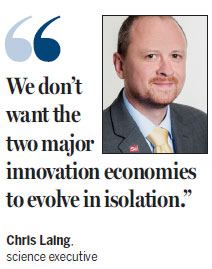
|
Chris Laing (center), with Wang Yiqing (right), program officer from the China Education Association for International Exchange, and Lu Sibin, Laing's interpreter, at the opening ceremony of the inaugural Zhi-Xing Eisenhower Fellowship held at Renmin University of China in Beijing in October 2015. Provided To China Daily |
Experience teaches there are more and more opportunities to cooperate and solve the world's problems
Chris Laing was born in Hong Kong but he had never made it to the Chinese mainland until last year.
Laing was one of 10 American mid-career leaders from the public, private and nonprofit sectors chosen to participate in the first Zhi-Xing China Eisenhower Fellowships Program, which had its genesis in annual talks on people-to-people exchange between Vice-Premier Liu Yandong and US Secretary of State John Kerry. The program is designed to advance greater understanding between the two nations.
The 10 traveled to the Chinese mainland in October 2015 for a month-long exploratory trip.

"I have family connections in HK and Macao but had never been to the mainland before. This is the first time I've had the chance to visit it. I haven't previously had any professional nor personal networks in the mainland," said Laing, vice-president of science and technology at the University City Science Center in Philadelphia.
As a child, Laing immigrated to Australia from Hong Kong with his family, where he earned a PhD in molecular endocrinology from the University of Sydney. He then completed his post-doctoral training at the University of Pennsylvania's School of Medicine in 2004, when he began working with the Science Center as a consultant in 2004 and joined the staff as director of Science & Technology in 2006.
In May 2010, Laing was promoted to vice-president, a role in which he oversees several programs at the center and provides direct R&D strategy support to Science Center Port business incubator companies and facilitates their access to Greater Philadelphia's academic and clinical communities through the Science Center's Scientific Advisory Committee for the Board of Directors.
He said he wanted to create networks in the mainland and to study aspects of its growing innovation activities.
Laing visited a variety of organizations that support science and technology and innovation in Beijing, Shanghai, Nanjing, Xi'an and Chengdu.
He met with leaders at the Ministry of Science and Technology, provincial and city level governmental entities, universities, accelerators and technology parks and companies.
He said he learned a lot about emerging innovation ecosystems in the mainland. "China, like the US, is a large country with diverse communities that shows geographic variation in terms of the type of economic development," he said.
"In the future, I would be interested in understanding how policies related to innovation are influencing these communities differently, for example, in the far west, versus in the very well developed eastern seaboard. We see here in the US that polices related to innovation have different effects in urban centers versus rural centers," Laing said.
In conversations with his Chinese counterparts, Laing was surprised to find that the challenges faced by people who work in the science and innovation space on the mainland seem the same as many of those faced by his colleagues here in the US. "Often, when I asked questions about hurdles for innovation, the answers that I received were very similar to those I would expect from my colleagues in the US," he said.
His experience has made him realize that "there are many more opportunities to collaborate than we are taking advantage of. We are really trying to solve the same problems. We don't want the two major innovation economies to evolve in isolation. We should be finding ways to solve common problems collaboratively, rather than separately."
Laing found his interactions with people on the mainland encouraging. "I met many people who desire to create, to innovate and to make the world a better place. They were very welcoming and eager to exchange ideas. This left me with a desire to seek ways in which we can work more closely. I see possibilities to create strong relationships with people on the mainland," Laing said.
Laing said his trip to the mainland "certainly affects" his professional thinking.
"My experience has pushed me to think about ways in which we may be able to create collaborative opportunities. I have two or three concepts that are in development; I'm not sure whether they will materialize yet - but I'm hopeful. We are working on a couple of ideas and are in continued discussion with several Chinese counterparts. So watch this space!
"I think when you spend an intensive amount of time immersed in a place as big and as diverse as China, it takes a long time afterwards to process your ideas and to focus in on what are the best ways to create practical outcomes. I'm in that process right now," Laing said.
Laing said that since he returned to Philadelphia, representatives from two organizations that he visited on the mainland have called on him in the US.
Most recently, a delegation from Shanghai Jiao Tong University visited the Science Center at the end of March. He said he has created some connections that they have been following through, and he is excited about the possibilities.
"I believe that I can use the experience to help to create meaningful networks that will hopefully allow Americans and Chinese organizations to collaborate in technology and innovation commercialization. And I believe we can each learn how to create and improve innovation ecosystems in China, in the US and elsewhere," he said.
Laing said he hopes that his first trip to the mainland was "the first of many".
leshuodong@chinadailyusa.com
Modern science is racing to catch up with Earth's plant life